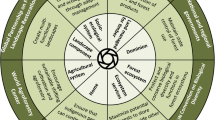Abstract
The Forest Stewardship Council (FSC) is a global private governance system overseeing the sustainability and biodiversity of the world forestry system through certification of forests and forestry processes and products, and is perceived as the strongest of the various certification schemes available (Domask, Globalization and NGOs: Transforming Business, Government, and Society, 2003; Gulbrandsen, Global Environmental Politics, 2004). It has seen more success in developed than developing countries in terms of amount of forest certified and number of chain-of-custody certificates issued, raising questions as to its ability to promote biodiversity Gulbrandsen, Global Environmental Politics, 2004). A number of challenges have risen to the pragmatic and moral legitimacy of the FSC as a global governance system: alternative certification schemes, output and market access, cost of certification, plantations, and illegal logging. I examine each of these challenges as they pertain to the dimensions of pragmatic and moral legitimacy of the FSC. I conclude with a discussion of theoretical implications for global governance systems using ecolabel schemes, as well as a discussion of practical implications for the FSC in particular.
Similar content being viewed by others
References
Bernstein, S.: 2004, The Elusive Basis of Legitimacy in Global Governance: Three Conceptions. Globalization and Autonomy Working Paper Series, Institute for Globalization and the Human Condition, McMaster University.
Bernstein, S., & Cashore, B.: 2004, ‹Is forest certification a legitimate alternative to a global forest convention?’, in J. J. Kirton & M. J. Trebilcock (eds.) Hard Choices, Soft Law: Voluntary Standards in Global Trade, Environment and Social Governance (Global Environmental Governance) (Surrey, UK: Ashgate).
Blichfeldt, G.: 1998, Green Labels for Fish Products – Consumer Power vs. Democracy? Paper Presented at the 9th International Conference of the International Institute of Fisheries Economics and Trade, (Tromso, Norway).
Brack, D.: 2005, ‹Controlling illegal logging and the trade in illegally harvested timber: The EU’s Forest Law enforcement, governance and trade initiative’, Receil 14, 28-38.
Buchanan, A., & Keohane, R. O.: 2006, ‹The legitimacy of global governance institutions’, Ethics and International Affairs 20, 405–37.
Cashore, B., & Vertinsky, I.: 2000, ‹Policy networks and firm behaviors: Governance systems and firm responses to external demands for sustainable forest management’, Policy Sciences 33, 1-30.
Clapp, J.: 1998, ‹The privatization of global environmental governance: ISO 14000 and the developing world’, Global Governance 4, 295-316.
Cornes, R., & Sandler, T.: 1986, The Theory of Externalities, Public Goods, and Club Goods (Cambridge: Cambridge University Press).
DiMaggio, P. J., & Powell, W. W.: 1983, ‹The iron cage revisited: Institutional isomorphism and collective rationality in organizational fields’, American Sociological Review 48, 147-160.
Domask, J.: 2003, ‹From boycotts to global partnership: NGOs, the private sector, and the struggle to protect the world’s forests’, in J.P. Doh and H. Teegen (eds.), Globalization and NGOs: Transforming Business, Government, and Society (Westport, CT: Praeger Publishers), pp. 157–186.
Down in the woods: March 23, 2006, The Economist, http://www.economist.com/business/displaystory.cfm?story_id=E1_VGVQJST.
Espach, R.: 2006, ‹When is sustainable forestry sustainable? The Forestry Stewardship Council in Argentina and Brazil’, Global Environmental Politics 6, 55-84.
Falkner, R.: 2003, ‹Private environmental governance and international relations: Exploring the links’, Global Environmental Politics 3, 72-87.
Gulbrandsen, L. H.: 2004, ‹Overlapping public and private governance: Can forest certification fill the gaps in the global forest regime?’, Global Environmental Politics 4. 75-98.
Hardin, G.: 1968, ‹The tragedy of the commons’, Science,162: 1243-1248.
Hobbes, T.: 1999, Leviathan, or the Matter, Forme and Power of a Common-Wealth, Ecclesiasticall and Civill (Hamilton, ONT: McMaster University) (Original work published 1651).
Jepperson, R. L.: 1991, ‹Institutions, institutional effects, and institutionalism’, in W. W. Powell & P. J. DiMaggio (eds.), The New Institutionalism in Organizational Analysis. (Chicago: University of Chicago Press), pp.143-163.
Koppell, J. G. S.: 2008, ‹Global governance organizations: Legitimacy and authority in conflict’, Journal of Public Administration Research and Theory 18, 177–203.
Matten, D., & Crane, A.: 2005, ‹Corporate citizenship: Toward an extended theoretical conceptualization’, Academy of Management Review 30, 166-179.
Ostrom, E.: 1990, Governing the Commons: The Evolution of Institutions for Collective Action (New York: Cambridge University Press).
Pattberg, P.: 2005a, ‹The institutionalization of private governance: How business and nonprofit organizations agree on transnational rules’, Governance: An International Journal of Policy, Administration, and Institutions 18, 589-610.
Pattberg, P.: 2005b, ‹What role for private rule-making in global environmental governance? Analysing the Forest Stewardship Council (FSC)’, International Environmental Agreements 5, 175-189.
Pattberg, P: 2006, ‹Private governance and the south: Lessons from global forest politics’, Third World Quarterly 27, 579-593.
Peters, B.G. & Pierre, J.: 1998, ‹Governance without government? Rethinking public administration’, Journal of Public Administration Research and Theory 8(2), 223-243.
Roberts, S.: 2003, ‹Supply chain specific? Understanding the patchy success of ethical sourcing initiatives’, Journal of Business Ethics 44, 159-170.
Schepers, D. H.: 2006, ‹The impact of NGO network conflict on the corporate social responsibility strategy of multinational corporations’, Business & Society 45, 282-299.
Sethi, S. P.: 1979, ‹A conceptual framework for environmental analysis of social issues and evaluation of business response patterns’, Academy of Management Review 4, 63-74.
Sethi, S. P.: 2003, Setting Global Standards: Guidelines for Creating Codes of Conduct in Multinational Corporations (Hoboken, NJ: John Wiley & Sons).
Sethi, S. P., & Emelianova, O.: 2006, ‹A failed strategy of using voluntary codes of conduct by the global mining industry’, Corporate Governance: The International Journal of Effective Board Performance 6, 226-238.
Suchman, M. C.: 1995, ‹Managing legitimacy: Strategic and institutional approaches’, Academy of Management Review 20, 571-610.
‹World’s Forests Continue to Shrink’: 2006, June 1, USA Today, p. 16.
World Rainforest Movement: 2003, Certifying the Uncertifiable (Montevideo, UR), http://www.wrm.org.uy.
Zyglidopoulos, S. C.: 2003, ‹The issue life-cycle: Implication for reputation for social performance and organizational legitimacy’, Corporate Reputation Review 6 (1): 70–81.
Author information
Authors and Affiliations
Corresponding author
Rights and permissions
About this article
Cite this article
Schepers, D.H. Challenges to Legitimacy at the Forest Stewardship Council. J Bus Ethics 92, 279–290 (2010). https://doi.org/10.1007/s10551-009-0154-5
Received:
Accepted:
Published:
Issue Date:
DOI: https://doi.org/10.1007/s10551-009-0154-5




